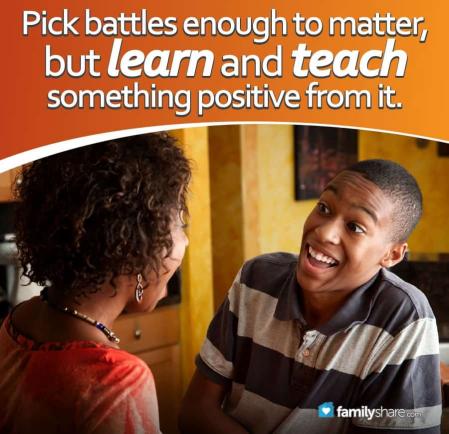
When you're living with a teenager, conflict may be unavoidable. Learning how to handle the issues that arise is less about each issue as it is about attitudes and responsibilities. As the parent, you should be the one to remain in control and/or diffuse the anger from escalating. Here are three highly important things to remember when conflict arises with your teen:
Remain calm and don't engage the argument
The typical scenario that starts an argument at home could be one of many reasons, but usually begins after a parent asks or informs a child to do something that the child doesn't want to do. The child then lashes out. Not to be outdone, the parent quickly has a comeback or re-issues the command and on and on the argument goes. If you can accept this one small guideline: Never engage the argument, your home will be much calmer. What happens when you fail to engage your child after a comeback is that they are left to ponder your last statement. For instance, if you reminded your child about doing their homework and they had one of a thousand excuses they started arguing with if you simply don't respond they are left thinking about your last statement about the homework. More often than not, this is enough that they will self-talk themselves into complying.
Establish boundaries and come up with solutions together
Long before conflicts arise, you can establish boundaries that will be respected during an argument. These boundaries should include, how anyone can call a time-out or cool down period, how to ensure that everyone is treated fairly and speaks with respect, and specifics on how to present and resolve conflicts. When a conflict arises, both you and your child know what the expectations are and have ways of beginning to deal with the conflict. If you must have a conversation about an issue, the goals should be to remove the anger and talk calmly to discuss options and come up with possible solutions together.
Affirm, forgive and thank
It's crucial that during a conflict you don't allow personal attacks to happen. While the behavior or choices may be wrong, it's essential to let your child know that you don't think they are bad or wrong—just the choice or the action. Make sure that as you resolve the conflict you re-affirm your love for your child, you forgive each other for any harsh words or actions, and you thank your child for being willing to work out their conflict with you. This will help to build up the relationship again and could help avoid additional conflict in the future.
If you can remember to avoid engaging whenever possible, when it does happen you can guide the conflict toward a positive resolution. You'll find your child will follow your example, as well.

